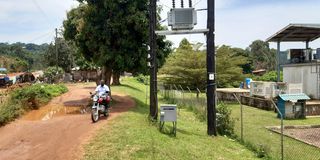High power tariffs affecting revenue in Kalangala

A motorcycle rider passes by a transformer at Mwena Landing Site in Kalangala District. The current power in the area is generated from a solar plant. PHOTO | SYLVESTER SSEMUGENYI
What you need to know:
- Power tariffs in Kalangala stand at Shs1,094 per unit for domestic users up from Shs900 in July while commercial users pay Shs1,407 compared to Shs980 in July.
Leaders in Kalangala District have tasked the government to explain the delayed implementation of a multi-billion power submarine cable project in the area.
They say delay has frustrated businesses, thereby affecting the revenue.
The Shs32b project, which was launched in October 2020, was expected to boost power supply.
Government planned to start laying the 33kilovolt submarine cable through Lake Victoria to evacuate electricity from the mainland via Bukakkata in Masaka District to Kalangala in March, but Daily Monitor has learnt that the manufacturer has not yet shipped it into the country.
Consumers are complaining of the high cost of electricity that has led to the collapse of many businesses.
Power tariffs in Kalangala stand at Shs1,094 per unit for domestic users up from Shs900 in July while commercial users pay Shs1,407 compared to Shs980 in July.
Mr Rajab Ssemakula, the Kalangala District chairperson, said revenue has reduced by 50 percent.
“The current power tariffs are not only a threat to businesses, but to security of the area as many residents no longer switch on security lights in the night.
“The marine power cable would have come to our rescue, but we don’t know what happened to the project,” Mr Ssemakula said during an interview last week.
Mr Peter Ssenyanja, the Bujumba Sub-county chairperson, said landing sites such as Buyiri would contribute a desirable revenue package for the district if they were connected to the national power grid.
“We are really tired of these unending electricity woes in Kalangala. Even those who have it are complaining about heavy bills. We need a lasting solution to this problem,” he said.
In an interview last year, Ms Irene Batebe, the permanent secretary in the Ministry of Energy, said manufacturing of the power submarine cable was delayed by the Covid-19 pandemic.
Ms Joan Mutiibwa Kayanga, the chief executive officer of Rural Electrification Agency (REA), which is managing the project, said the power submarine cable can only be shipped into the country when all arrangements for laying it are complete.
“The submarine cable cannot be kept in the warehouse, we need to first work on all the required works for it to be laid,” she said.
“Despite the Covid-19 setback, most of the grid extension is done, transformers and transmission lines have already been installed awaiting connection once the cable arrives,” she added.
The project is under the Uganda Rural Electricity Access Project and CCC (Beijing) Industrial and Commercial Company Ltd was contracted to do the work. It will connect the landing sites of Kasamba, Lwabalega, Katooke, Buyiri, Kisalamala, Bwamba, Lusozi, Semasiga and Mukoko in Mugoye Sub-county before it crosses to other nearby islands of Bunyaama, Bufumira, and Kitobo.
Currently, nine of 33 landing sites on Buggala main island have no power, which has retarded development.
Some of the landing sites with power include Kasamba, Lwabalega, Katooke, Buyiri, Kisalamala, Bwamba, Lusozi, Semasiga and Mukoko in Mugoye Sub-county.




